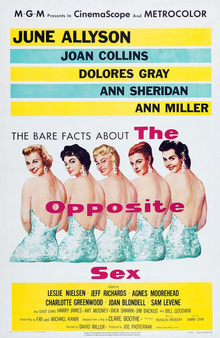Poorly Directed by David Miller, the Metrocolor-CinemaScope picture is a terrible remake of Cukor’s 1939 cult comedy ‘The Women’
| The Opposite Sex | |
|---|---|

Theatrical release poster
|
|
Both 1939 and 1956 films are based on Clare Boothe Luce’s original 1936 play “The Women.”
However, unlike the 1936 play and the 1939 film adaptation, The Opposite Sex includes musical numbers and features male actors who portray the husbands and boyfriends, whose characters were only referred to in the previous film and stage versions.
Unfortunately, this change alters the structure and tone of the base storyline significantly.
Kay Hilliard, a former nightclub singer, discovers that her husband, theater producer Steven, is having an affair with showgirl Crystal Allen. Kay is the last to find out among her circle of gossiping girlfriends. Kay travels to Reno to divorce Steve, who then marries Crystal, but when Kay learns that Crystal is not faithful, she starts fighting to win her ex-husband back.
Fay Kann, who cowrote the script with husband Michael, said the studio’s argument was “you can’t play a love scene alone. The studio felt the movie audience would somehow be disappointed at not seeing men in it. After all, a man is a fact.”
Kanin thought that the play’s “manless world” was “a stunt, an artificial trick. But in a movie, which has the freedom to go out, the device would seem constrained and self conscious. We only put in men to relieve the strain – and only when they are called for.”
The Kanins gave the story a show business background to justify its promotion as a musical, but there are no big production numbers; Jo Ann Greer dubbed Allyson’s ballad “A Perfect Love.”
In the 1939 The Women, Lucille Watson played Mrs. Morehead, the loving, wise, and supportive mother of Norma Shearer’s character Mary Haines. For the 1956 version, the role was eliminated, and a new character was created instead–Amanda Penrose (Ann Sheridan), a playwright who served as Kay Hilliard’s friend confidant.
Barbara Jo Allen appeared in both the 1939 and 1956 versions—in the first film, she had small, uncredited part as receptionist; in the second, she played gossip columnist Dolly DeHaven.
This was Allyson’s final film at MGM, after having worked at the studio for 15 years.
The film earned $1,735,000 in the U.S.nd $1,025,000 in other markets, resulting in a loss of $1,513,000.
June Allyson as Kay Hilliard
Joan Collins as Crystal Allen
Dolores Gray as Sylvia Fowler
Ann Sheridan as Amanda Penrose
Ann Miller as Gloria Dell
Leslie Nielsen as Steven Hilliard
Jeff Richards as Buck Winston
Agnes Moorehead as Countess Lavaliere
Charlotte Greenwood as Lucy
Joan Blondell as Edith Potter
Sam Levene as Mike Pearl
Bill Goodwin as Howard Fowler
Alice Pearce as Olga
Barbara Jo Allen as Dolly
Sandy Descher as Debbie Hilliard
Carolyn Jones as Pat
Alan Marshal as Ted
Jonathan Hole as Phelps Potter
Harry James as himself
Art Mooney as himself
Dick Shawn as singer
Jim Backus as psychiatrist
Barrie Chase as specialty dancer (uncredited)
Gordon Richards as Hilliards’ butler (uncredited)
Dean Jones as backstage delivery person (uncredited)
Leslie Parrish as leg model (uncredited)
Juanita Moore as powder room attendant (uncredited)
Screenplay by Fay Kanin and Michael Kanin, based on The Women, 1936 play
by Clare Boothe
Produced by Joe Pasternak, Sam Levene
Edited by John McSweeney Jr.
Music by Nicholas Brodszky, Sammy Cahn, Ralph Freed, George Stoll
Robert Van Eps
Production company: MGMDistributed by Loew’s Inc.
Release date: October 26, 1956
Running time: 117 minutes
Budget $2.8 million










